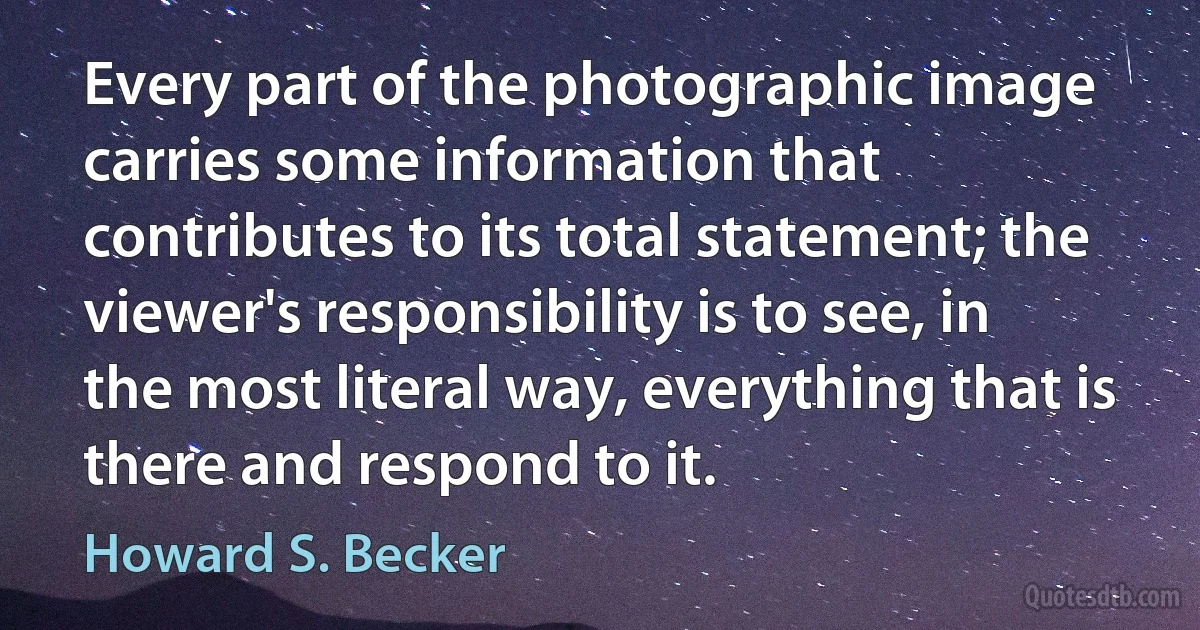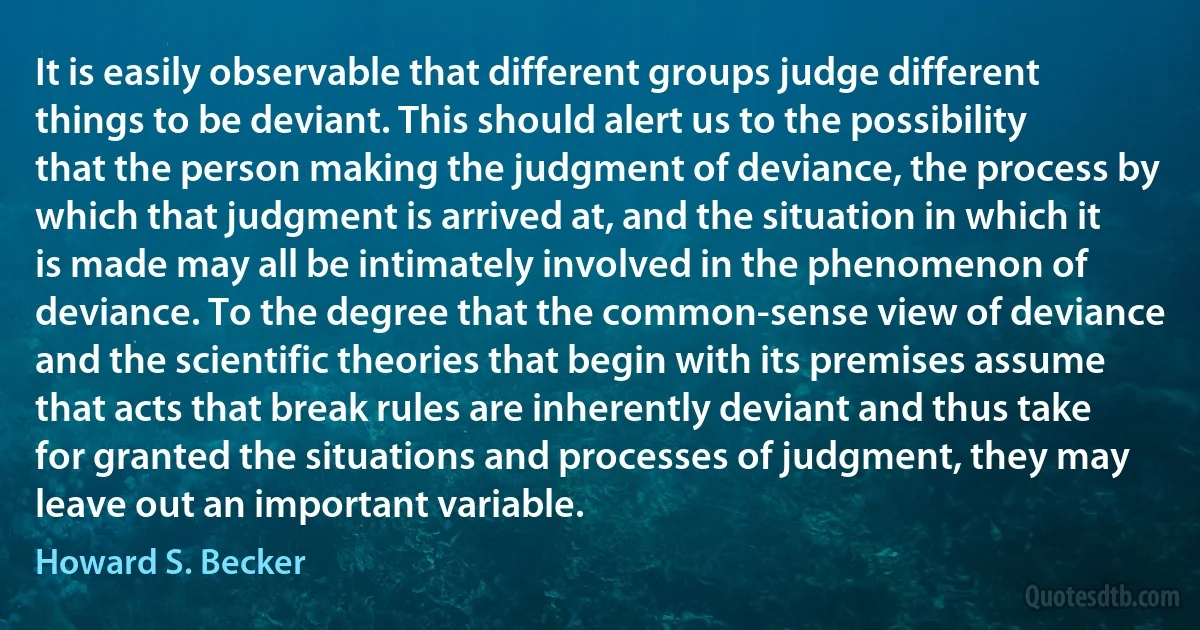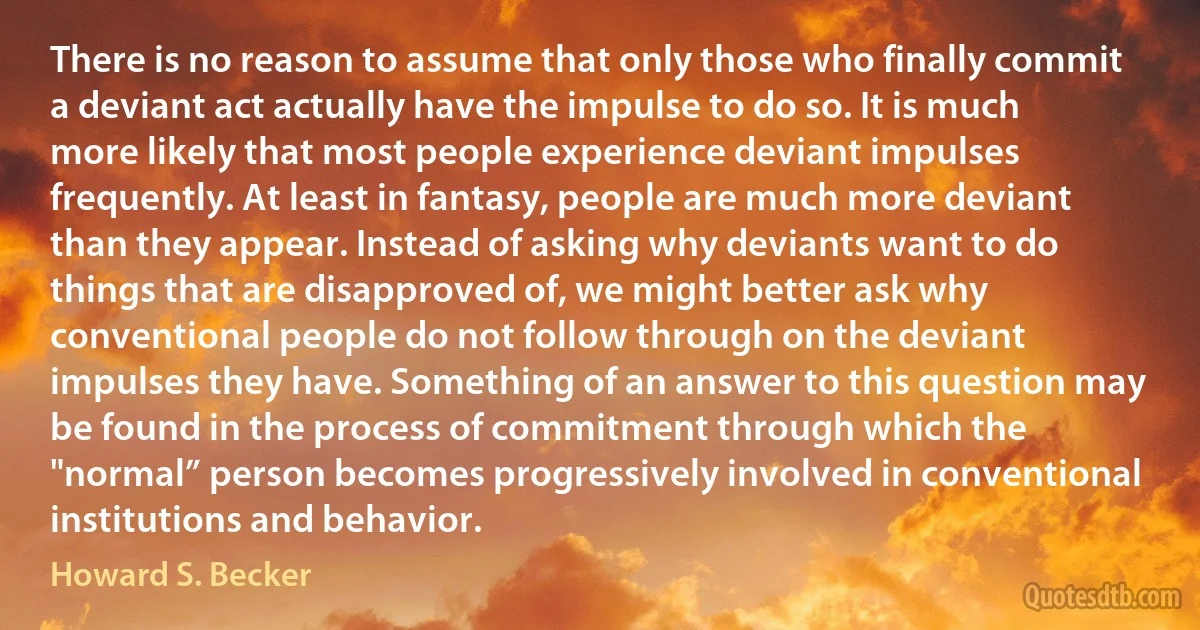Howard S. Becker quotes
Photographers learn to interpret photographs in that technical way because they want to understand and use that ‘language' themselves (just as musicians learn a more technical musical language than the layman needs). Social scientists who want to work with visual materials will have to learn to approach them in this more studious and time-consuming way.

Howard S. Becker
Deviance - in the sense I have been using it, of publicly labeled wrongdoing - is always the result of enterprise. Before any act can be viewed as deviant, and before any class of people can be labeled and treated as outsiders for committing the act, someone must have made the rule which defines the act as deviant. Rules are not made automatically. Even though a practice may be harmful in an objective sense to the group in which it occurs, the harm needs to be discovered and pointed out. People must be made to feel that something ought to be done about it. Someone must call the public's attention to these matters, supply the push necessary to get things done, and direct such energies as are aroused in the proper direction to get a rule created. Deviance is the product of enterprise in the largest sense; without the enterprise required to get rules made, the deviance which consists of breaking the rule could not exist.

Howard S. Becker
The tension between making it better and getting it done appears wherever people have work to finish or a product to get out: a computer, a dinner, a term paper, an automobile, a book. We want to get it done and out to the people who will use it, eat it, read it. But no object ever fully embodies its maker's conception of what it could have been. Human frailty, your own and that of others, makes flaws and mistakes inevitable.

Howard S. Becker
For any picture, ask yourself what question or questions it might be answering. Since the picture could answer many, questions, we can decide what question we are interested in. The picture will, of course, suggest that some questions are likely to find answers in it. For instance, Owens's pictures of pantries and refrigerators clearly suggest that they will answer questions about what kinds of food the inhabitants of the houses store and presumably eat, while other pictures in Suburbia suggest that they will answer other questions about the housekeeping arrangements of these people.

Howard S. Becker
John Cage said that music is the moral evaluation of sound. We might generalize his remark: when we speak of art, we make a moral evaluation of the relative worth of the various contributions to a work. It is no surprise that many of the participants differ with more conventional evaluations and rank their own contributions as more important than that of the artist as conventionally defined.

Howard S. Becker
There is little disagreement about what constitutes a healthy state of the organism. But there is much less agreement when one uses the notion of pathology analogically, to describe kinds of behavior that are regarded as deviant. For people do not agree on what constitutes healthy behavior... The medical metaphor limits what we can see much as the statistical view does. It accepts the lay judgment of something as deviant and, by use of analogy, locates its source within the individual, thus preventing us from seeing the judgment itself as a crucial part of the phenomenon.

Howard S. Becker
I ... view deviance as the product of a transaction that takes place between some social group and one who is viewed by that group as a rule-breaker. I will be less concerned with the personal and social characteristics of deviants than with the process by which they come to be thought of as outsiders and their reactions to that judgment.

Howard S. Becker
The "normal” person, when he discovers a deviant impulse in himself, is able to check that impulse by thinking of the manifold consequences acting on it would produce for him. He has staked too much on continuing to be normal to allow himself to be swayed by unconventional impulses.

Howard S. Becker
Even in the simplest societies, no two people learn quite the same cultural material; the chance encounters of daily life provide sufficient variation to ensure that. No set of cultural understandings, then, provides a perfectly applicable solution to any problem people have to solve in the course of their day, and they therefore must remake those solutions, adapt their understandings to the new situation in the light of what is different about it.

Howard S. Becker
The point is professionalization. Academics-in-training worry about whether they are yet, can ever be, or even want to be professional intellectuals of the kind they are changing themselves into. Second or third or fourth year graduate students have not taken binding vows. They may have second thoughts. Nor have they been finally chosen. They might flunk out. Their committee might turn their theses down. Who knows what might happen?

Howard S. Becker
The audience is unpredictable, and the people who produce and distribute the artistic work have no real contact with it. They market the work in large quantities as with books and records, or through a mechanical system, as with radio and television, so that they could not, if they tried, know audience members personally.

Howard S. Becker
In addition to recognizing that deviance is created by the responses of people to particular kinds of behavior, by the labeling of that behavior as deviant, we must also keep in mind that the rules created and maintained by such labeling are not universally agreed to. Instead, they are the object of conflict and disagreement, part of the political process of society.

Howard S. Becker
The prototype of the rule creator, but not the only variety as we shall see, is the crusading reformer. He is interested in the content of rules. The existing rules do not satisfy him because there is some evil which profoundly disturbs him. He feels that nothing can be right in the world until rules are made to correct it. He operates with an absolute ethic; what he sees is truly and totally evil with no qualification. Any means is justified to do away with it. The crusader is fervent and righteous, often self-righteous.

Howard S. Becker
That accounts for a truly crazy cycle in which students repeat the worst stylistic excesses the journals contain, learn that those very excesses are what makes their work different from what every damn fool knows and says, write more articles like those they learned from, submit them to journals whose editors publish them because nothing better is available (and because academic journals cannot afford expensive copy editing) and thus provide the raw material for another generation to learn bad habits from.

Howard S. Becker
Even though no one else discovers the nonconformity or enforces the rules against it, the individual who has committed the impropriety may himself act as the enforcer. He may brand himself as deviant because of what he has done and punish himself in one way or another for his behavior.

Howard S. Becker



